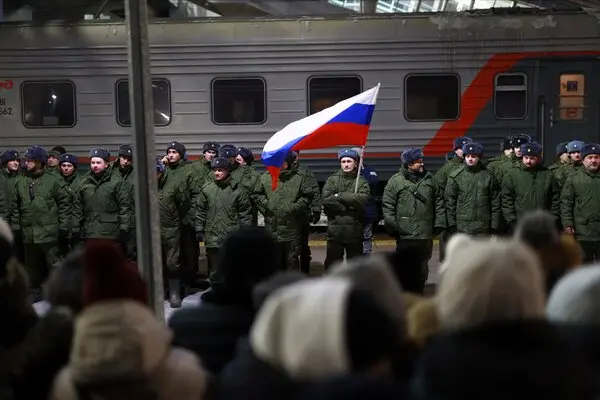Fact Sheet: Biden’s Failure to Deter Russia
February 21, 2023
From the day he took office, President Biden and his team implemented a series of policies that strengthened Putin’s hand, undermined Ukraine, signaled weakness, and demonstrated a dangerous lack of willingness to defend Ukraine.
Yesterday, President Biden admitted that this war was launched despite the U.S. having advanced warnings months ahead of time. Biden diagnosed the failure of deterrence well: “Putin thought Ukraine was weak and the West was divided…he thought he could outlast us.” President Biden is directly responsible for laying that groundwork for Putin’s assessment.
15 Key Actions Biden Took That Encouraged Russia to Invade Ukraine:
January 20, 2021: Biden launches war on American energy – President Biden cancels the Keystone XL pipeline and bans all new federal drilling, handicapping the American oil and gas industry and killing as many as 59,000 jobs. European allies intensify their reliance on Russian energy supplies.
January 27, 2021: U.S. announces re-entry into New START Treaty – President Biden re- entered the New START treaty with Russia in the first week of his presidency without any attempt to renegotiate the terms which were favorable to Russia. Three weeks ago, the Biden Administration admitted that Russia was violating their renewed treaty. The Trump administration had fought for the treaty to include China and be re-negotiated in a way that did not unfairly benefit Russia.
February 18, 2021: Biden cancels sanctions blocking Iranian-Russian weapons trade - Biden’s State Department unilaterally cancelled the Trump Administration’s snapback of UN Security Council Resolution 2231, which had reimposed the UN arms embargo against Iran supplying weapons to Russia and other countries or terror groups. After Biden’s move, Iran and Russia were able to legally conduct arms sales with each other. Biden received nothing in return from Iran or Russia.
March 2, 2021: Biden blocks $150 million in Ukrainian military aid – In a manner repeated multiple times throughout 2021, the Biden administration blocked significant amounts of military aid to Ukraine that had been authorized by Congress, claiming that Ukraine needed to implement certain reforms before receiving weapons.
May 7, 2021: Russian hackers shut down Colonial Pipeline, Biden does nothing – Russian hackers from the REvil syndicate used a ransomware attack to shut down pipelines across the southeast United States for nearly a week. Instead of holding Russia responsible for individual operating on their soil, Biden officials later said the President “believes in diplomacy”.
May 19, 2021: Biden waives sanctions on Nord Stream 2 – Against firm bipartisan opposition, Biden waived sanctions on the new Russian pipeline that sought to pump gas into Western Europe and isolate Ukraine. This move signaled to Putin that his previous coercive energy diplomacy was acceptable and that western funds would continue to pour into Russia.
June 18, 2021: Biden blocks another $100M in weapons for Ukraine – The White House halted a $100M package of lethal military aide to Ukraine, with NSC officials saying they would provide the package to Ukraine if Russia invaded the country, not beforehand to deter Russia.
July 20, 2021: Biden officials tell Ukrainians to shut up about Nord Stream 2: Politico reports that Biden administration officials tell Ukraine to stop their criticism of Biden’s deal with Germany to continue Russian gas shipments, and to not discuss any details of the deal with Congress.
August 15, 2021: Fall of Afghanistan – Biden pulls out of Afghanistan as the nation immediately falls to the Taliban, resulting in the deaths of 13 American servicemembers. The Washington Post reports that U.S. intelligence showed Putin believed Biden was “chastened by the humiliating withdrawal from Afghanistan and wanted to avoid new wars.” Accordingly, Putin believed the U.S. response to an invasion would be “high on outrage but limited in actual punishment”.
November 5, 2021: Biden rejects Republican calls for stronger presence in Black Sea - Key Republicans tell Biden to send troops and ships to the Black Sea and weapons to Ukraine to deter a Russian invasion. Biden’s Department of Defense declines to act, despite requests from Romania and Ukraine.
December 12, 2021: Biden Holds Back $200M in Aid - Despite appeals from Ukraine, Biden admin holds back additional military aid to Kyiv amid diplomatic push with Russia. Ukrainians will suffer in the early days of the war from this lack of weaponry.
January 11, 2022: Biden officials lobby Congress not to impose sanctions on Russian pipeline – Top Biden administration officials lobbied Senators to oppose sanctions on Nord Stream 2.
January 12, 2022: Biden tasks Wendy Sherman to prevent war – Biden sent the State Department’s Deputy Secretary Wendy Sherman, who negotiated the 1994 Joint Framework that allowed North Korea to develop a nuclear weapon and negotiated the JCPOA that allowed Iran to legally develop a nuclear weapon by 2031, with another vital task: preventing war.
January 19, 2022 – Biden: “It’s one thing if it’s a minor incursion” - Biden says that a minor incursion of Ukraine might not be met with a strong response and that they’d have to debate what to do. Ukraine’s President Zelenskyy chastises Biden.
February 4, 2022: State Department green-lights $10 billion Russian-Iranian nuke deal – As part of their efforts to appease Iran and Russia into join a new nuclear deal, the State Departmentissued waivers for a series of Iranian nuclear projects led by Russia’ state-owned nuclear enterprise, Rosatom. These waivers included a green-light for Russia to construct two nuclear reactors in Iran, a contract worth $10 billion.
February 24, 2022: Russia invades Ukraine – Meanwhile, the Biden Administration is still debating whether they think it is legal to send military aid to Ukraine, worrying it could be provocative.
Key Takeaway: The most provocative action of all was Biden’s repeated appeasements and weakness that signaled a bright green light to Putin that the costs of invading would be low.

